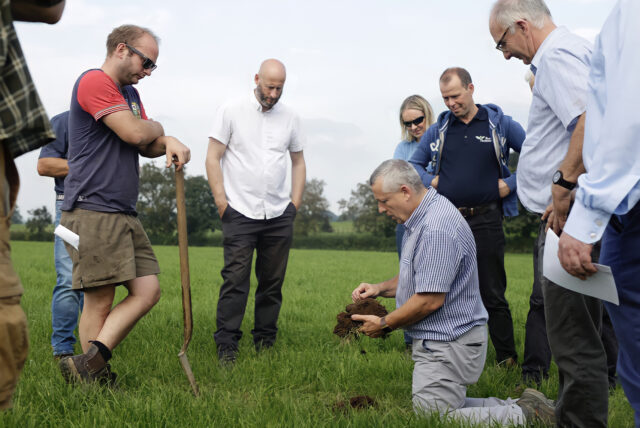Introducing our Round two Carbon Innovation Fund partners

Today, I’m pleased to announce seven new Carbon Innovation Fund partners, which are trialling exciting and innovative solutions to create a better, more resilient food and farming system. Our new partners, from across the UK, are experimenting with an array of projects from sources as diverse as human urine, mollusc shells and seaweed.
We made some changes to the application criteria for the second round of our £3.5m Carbon Innovation Fund, incorporating learning from our first round of funding last year. We decided to take a more focused approach to help UK farmers reduce their reliance on soy-containing animal feed and synthetic fertilisers. The projects we’ve chosen to fund hope to improve farming resilience in the UK, creating more sustainable communities.
Our partnership with Co-op
We’ve awarded over £1m from this round of grant-making from our largest environmental partnership with Co-op, in addition to the £1.4m from Round one. CIF is funded through Co-op donations from the sale of compostable carrier bags in the UK, as well as the Foundation’s own funds.
We’re excited to be working with organisations committed to revolutionising the way that we farm, who are reducing carbon emissions and share our commitment to sharing learning.
Welcome to our new CIF partners – we can’t wait to work with you!
Our new partners
Our fund builds upon our aim to create more sustainable communities, as part of our new strategy, ‘Building communities of the future together’. It is also an intrinsic part of Co-op’s Climate Plan, which acknowledges and responds to the current climate emergency, and its vision of ‘Co-operating for a fairer world’
Let me introduce you now to our incredible new partners:
- Câr-Y-Môr/For the Love of the Sea (Wales): Our £199k grant will help to scale up production of an ocean farm grown seaweed-based biological stimulant. The organisation hope this will allow them to create a product that reduces the need for synthetic fertilisers on farms.
- Farm Carbon Zero NI CIC, operating as Arc Zero, (Northern Ireland): Our £98k grant will help this collective of seven farmers, who are committed to reaching Net Zero, to improve the sustainability of their farms over the next 3 years
,and share the knowledge they develop. - Kent Wildlife Trust (England): Our £100k grant will support them to test the success of liquid compost to reduce farmers’ reliance on nitrogen-based fertiliser. Kent Wildlife Trust are also building a regional farming network to promote regenerative farming.
- Pontus Research Limited (Wales): Our £200k grant will support them to create low-carbon, soy-free alternatives to aquaculture feed, using sustainable and locally-sourced ingredients
- Scottish Association for Marine Science (SAMS), (Scotland): Our £199k grant will support them to research how different forms of marine waste, including shellfish, mollusc shells and seaweed can be repurposed to create new fertilisers.
- NPK Recovery (formerly Vandenburgh UK) (UK): Our £186k grant will support them to develop a nutrient-rich, environmentally sustainable fertiliser from human urine. The team hopes to eventually create a system that collects waste from festivals and events and processes it to supply local farming communities.
- WWF-UK (UK): Our £100k grant will support them to conduct trials to replace synthetic fertiliser with seaweed fertiliser on arable farms. This will help the team better understand whether seaweed fertiliser could become a commercially viable and environmentally friendly alternative.
Sign up to our blog to find out more about our CIF partners and for future funding opportunities.
